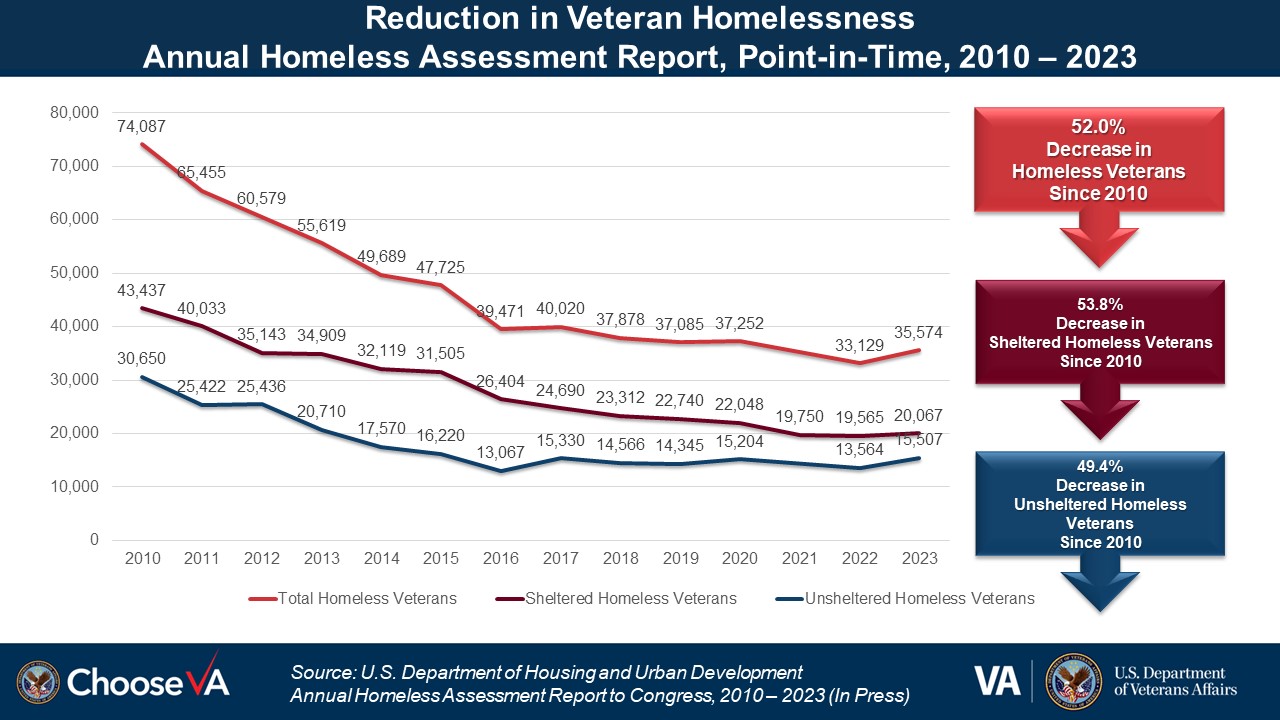The Department of Housing and Urban Development (HUD) announced the results of the 2023 Point-in-Time (PIT) Count, the annual effort to estimate the number of Americans, including Veterans, without permanent housing.
The data showed that on a single night in January 2023, there were 35,574 Veterans who experienced homelessness in the U.S. This reflects a 7.4% increase in the number of Veterans experiencing homelessness from 2022.
Despite these increases, there is still an overall downward trend in Veteran homelessness. The estimated number of Veterans experiencing homelessness in the U.S. has declined by 52.0% since 2010. Within the last three years alone, there has been approximately a 4% overall reduction in Veteran homelessness.
As with prior years, advocates for ending homelessness among Veterans have eagerly awaited these results, anticipating it would show the late-stage effects of the COVID-19 pandemic and the gradual end of pandemic-era protections.
A deeper look
Looking deeper at the data, we see that of the Veterans counted:
- 20,067 experienced sheltered homelessness—an increase of 502 Veterans, or 2.6% from 2022.
- 15,507 experienced unsheltered homelessness—an increase of 1,943 Veterans, or 14.3% from 2022.
Unsheltered Veterans represented nearly 80% of the overall increase.
Veterans who experience sheltered homelessness often live in emergency shelters, transitional housing programs, or other supportive settings. In contrast, Veterans who experience unsheltered homelessness live in places not meant for human habitation, such as cars, parks, sidewalks, abandoned buildings and literally on the street.
The experience of homelessness alone is already harmful to Veterans’ whole health—mind, body and soul. However, unsheltered homelessness among Veterans is even worse, with research demonstrating that unsheltered individuals often report more significant negative health conditions than those who are sheltered.
VA and our federal partners have made supporting unsheltered Veterans a top priority, both as part of our 2023 Homelessness Goals and the All Inside initiative. As of October 2023, VA has already engaged with 34,498 unsheltered Veterans to ensure they access to the shelter and housing resources they need. This has exceeded VA’s goal to engage with 28,000 unsheltered Veterans by 123.2%
Behind the numbers
We are currently analyzing the PIT Count data to identify reasons for the increase in Veteran homelessness. In the meantime, we know that different factors likely contributed.
- Housing affordability. According to the National Low Income Housing Coalition’s The Gap report for 2022, only 36 rental homes are affordable and available for every 100 extremely low-income renter households in the U.S. Consequently, even Veterans who receive housing vouchers may have difficulty using them in high-cost regions with housing shortages.
- The end to COVID-related supports. During the COVID-19 pandemic, numerous states and localities successfully expanded their emergency shelter capacity through hotels and motels due to increased resources and regulatory flexibilities. However, communities began decreasing the use of hotels when the COVID-19 Public Health Emergency ended, and many stopped providing non-congregate shelters altogether. Additionally, policies and resources that prevented evictions helped millions of households and contributed to fewer people entering homelessness. According to Princeton University’s Eviction Lab, there were 58% fewer evictions in 2020 and 2021 than pre-pandemic. While the investments in eviction prevention have kept eviction filings well below historical averages for nearly two years since the Center for Disease Control’s eviction moratorium ended, eviction filings in many communities appear to have returned to pre-pandemic levels.
When the need outpaces the resources
Bottom line: More Veterans needed homeless assistance resources than the existing capacity could help.
The downstream impact can be seen in VA’s goal to house 38,000 Veterans in 2022, which VA actually exceeded by housing over 40,000 Veterans. Despite these efforts, Veteran homelessness still increased by 7.4%.
Furthermore, overall homelessness increased by 12%, a larger increase than among Veterans. We’re confident that the rise in Veteran homelessness would have been worse if not for the significant actions taken to house more Veterans in 2022.
What the numbers don’t show
Notably, the 2023 PIT Count results do not reflect the significant actions we’ve taken this year to support homeless and at-risk Veterans. This past March, VA announced its 2023 goals for preventing and ending Veteran homelessness. And we’re making great progress. Over 38,847 more Veterans have been housed as of October 31, 2023, surpassing our goal two months earlier than projected.
This year, VA has also expanded access to health care for homeless Veterans, expanded access to legal assistance for homeless Veterans, helped more than 145,000 Veterans and their families retain their homes and avoid foreclosure, and awarded more than $1 billion in grant funding to help homeless Veterans.
The work ahead
One Veteran experiencing homelessness is one too many, let alone 35,574.
We are at a pivotal moment in the national housing and homelessness crises. And the solutions are clear:
- Double down on our work to prevent Veterans from becoming homeless in the first place.
- Connect homeless Veterans to permanent housing with supportive services.
- Establish an effective shelter system to support Veterans and their families.
- Increase the supply of affordable housing.
- Strengthen tenant protections and reduce evictions.
In collaboration with the U.S. Interagency Council on Homelessness, HUD, the Department of Labor, and other federal and local partners, VA will continue to execute evidence-based approaches, such as Housing First, to prevent and end homelessness among Veterans.
We won’t rest until every Veteran has a safe, stable, accessible and affordable home—and no Veteran experiences the tragedy and indignity of homelessness ever again.
Learn about VA Programs
If you are a Veteran who is homeless or at risk for homelessness, call the National Call Center for Homeless Veterans at 877-4AID-VET (877-424-3838).
Visit the VA Homeless Programs website to learn about housing initiatives and other programs for Veterans exiting homelessness.
Check out the Ending Veteran Homelessness podcast to learn more about what VA is doing about Veteran homelessness.
Learn how to get involved with housing homeless Veterans.
For more stories like these, subscribe to the Homeless Programs Office newsletter to receive monthly updates about programs and supportive services for Veterans experiencing or at risk of homelessness.
Topics in this story
Link Disclaimer
This page includes links to other websites outside our control and jurisdiction. VA is not responsible for the privacy practices or the content of non-VA Web sites. We encourage you to review the privacy policy or terms and conditions of those sites to fully understand what information is collected and how it is used.
More Stories
Seven U.S. Army soldiers, one Army Reserve soldier and two Veterans are representing Team USA at the 2024 Olympic Games in Paris, which begins today.
Study underscores important role COVID vaccination can have in protecting Veterans from infection and reducing long-term health consequences
Columbia VA’s robotic surgery teams completed their 800th robotic surgery and are on schedule to hit 1,000 by the end of the year.








17% huh? As people pass away the number of homeless go down. I’m not trying to say anything political. I’m just saying a claim like that doesn’t have much substance in relation to the big picture.
So with your data veteran homeless decreased under the current administration by 17%??? Are you serious… come to Oklahoma City there are hundreds of homeless veterans… HUNDREDS
TEsting this does it work.
In places like Chicago, there is great effort to shelter and take care of those who illegally entered the U. S., while homeless veterans are left behind. I’d like to see a press conference or rally with a large number of homeless veterans who would protest this.
I disagree with “affordable housing.”. No price is “affordable” to a veteran with NO money. What the VA needs to do is offer FREE housing with local, state, and federal taxes waived until the veterans can complete treatment, get a job or have a successful disability claim that allows them to finally afford a mortgage/rent. No time limit. Fix up a banded homes, furnish them and GIVE them to the veterans and their families.
I don’t believe that veterans homelessness has gone down. The VA has cooked the books on the numbers. They just want to make themselves look better.